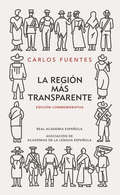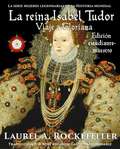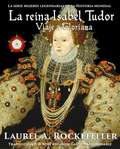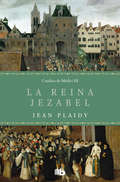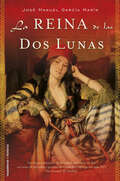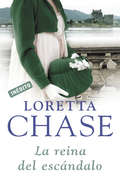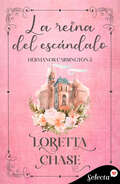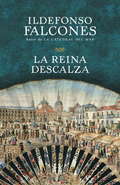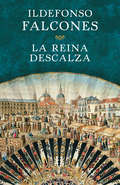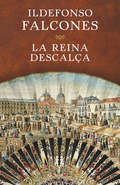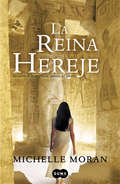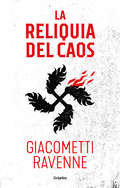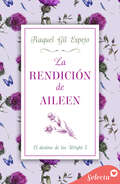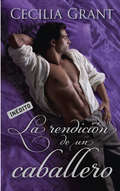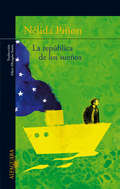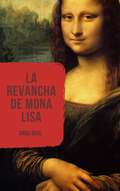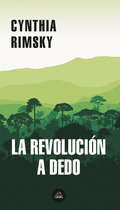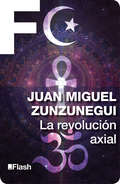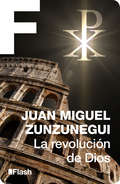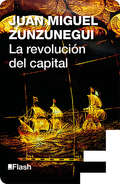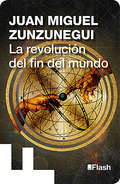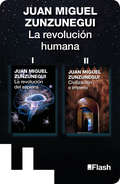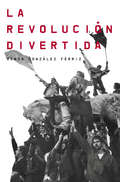- Table View
- List View
La región más transparente (Edición conmemorativa de la RAE y la ASALE #Volumen)
by Carlos FuentesEdición definitiva, revisada por su autor, de la «gran novela urbana» de la literatura mexicana. Preparada por la Real Academia Española y la Asociación de Academias de la Lengua Española. Considerada la fundadora del boom latinoamericano, La región más transparente se convirtió desde su aparición en una obra muy rompedora. Por el empleo de diversas técnicas literarias y novedades tipográficas, transgredía las tradiciones narrativas y abrió nuevos caminos para la creación literaria. Se la considera el punto de partida de una nueva forma de narrar dentro de la historia de la literatura mexicana. Esta edición incluye los imprescindibles estudios complementarios sobre el autor y la obra de académicos y críticos fundamentales como Gonzalo Celorio, José Emilio Pacheco, Vicente Quirarte, Carmen Iglesias, Sergio Ramírez, Nélida Piñon y Juan Luis Cebrián. La crítica ha dicho sobre la colección de ediciones conmemorativas:«Un club [la colección de ediciones conmemorativas] que ya cuenta con invitados más que ilustres.»El País «Sean bienvenidas, por muchos motivos, estas ediciones conmemorativas auspiciadas por instituciones académicas del mayor rango. Unas ediciones que, por sus precios populares, y ahora que los buenos libros han pasado a ser un objeto de lujo, facilitan al gran público el acceso a unos autores que, paradójicamente, no por ser -clásicos- de la literatura en lengua castellana (antiguos o modernos) dejan de ser para algunos, aún hoy, unos grandes desconocidos.»El Imparcial
La reina Isabel Tudor: Edición estudiante-maestro (Mujeres Legendarias de la Historia Mundial #4)
by Laurel A. RockefellerLa reina Isabel es quizás el gobernante más legendario y célebre de la historia de Inglaterra. Sin embargo, ¿realmente la conoces tan bien como crees? En esta hermosa biografía narrativa, exploras el camino de Isabel de "Lady Isabel" a "Gloriana" a través del lente de su relación con Robert Dudley, una relación mucho más polémica de lo que la mayoría de la gente cree. La política y la religión chocan, provocando que Isabel se consuele con su música, y una decisión difícil se presenta ante ella mientras los complots contra su vida amenazan su trono. Haz el viaje a Gloriana y descubre un lado de Isabel que nunca supiste que existía. La edición estudiante-maestro incluye preguntas de estudio después de cada capítulo, además de apéndices con seis canciones medievales isabelinas, una cronología detallada y una extensa lista de lecturas sugeridas. Este libro continúa "María Reina delos escoceses".
La reina Isabel Tudor: Viaje a Gloriana
by Laurel A. Rockefeller"Se me ha ordenado por su consejo ir a la Torre, un lugar más apto para un falso traidor que para un súbdito verdadero, lo que, por lo que se, lo quiera o no, aún ante este reino lo soy", escribió la Princesa Isabel Tudor en su carta de última hora a su hermana la Reina María mientras los guardias esperaban para transportarla a la Torre de Londres. La reina Isabel es tal vez la soberana más legendaria y celebrada en la historia inglesa. Aún así, ¿crees que la conoces suficientemente bien? En esta hermosa biografía narrativa, explorarás el camino de Isabel desde "Lady Isabel" hasta "Gloriana" a través de la lente de su relación con Robert Dudley, una relación mucho más contenciosa de lo que la mayoría de la gente cree. Política y religión colisionan, provocando que Isabel se tenga que consolar a sí misma con su música; y una decisión muy difícil se presenta ante ella mientras complots en su contra amenazan el trono. Toma el viaje a Gloriana y descubre un lado de Isabel que no sabías que existía. El libro incluye seis canciones medievales e Isabelinas, una línea de tiempo detallada, así como una extensa lista de lecturas sugeridas. Continúa "María reina de los escoceses".
La reina Jezabel (Trilogía de los Médici #Volumen 3)
by Jean PlaidyLa tercera parte de la fabulosa trilogía sobre Catalina de Médici, uno de los personajes más fascinantes de la historia. La madrugada del 24 de agosto de 1572, Catalina de Médici agregó a su largo historial su crimen más significativo: la Noche de San Bartolomé. A causa de sus procedimientos maquiavélicos, la locura se apoderó de los católicos de París y las calles de la ciudad se tiñeron con la sangre de los hugonotes. Era el principio del fin del reinado de Catalina de Médici, que, fría e implacable, gobernó mientras sus fuerzas le permitieron mantener el poder y dominar a sus débiles hijos cuando toda Francia ansiaba que pagara por sus crímenes.
La reina de las dos lunas
by José Manuel García MarínUn retrato histórico de la ciudad milenaria de Fez, así como de las calles y posadas de Córdoba y Málaga del siglo XVI. Una novela basada en un hecho real que supera la ficción. Un canto a la libertad y al amor. En 1520 la joven esposa del despiadado sultán de Fez, enamorada de un esclavo cristiano y de su propia independencia, huye con este a España, para terminar por establecerse en Mijas, después de innumerables vicisitudes.Carlos V y Germana de Foix apadrinaron el bautizo de la sultana, que adoptó el nombre de doña Juana de Carlos. Solo la unión de dos personajes de carácter tan acusado, una joven rebelde y un muchacho valiente que clama venganza, podían consumar con éxito esta hazaña. Una novela rodeada de sedas, aromas, perfumes, música, las insinuantes danzas de las esclavas del harén y el erotismo de los baños y juegos femeninos, en los que conoceremos los escenarios de la huida, perseguidos por la guardia del sultán.
La reina del escándalo (Hermanos Carsington #Volumen 5)
by Loretta ChaseUna noche de escándalo nunca es suficiente... Quinta y última novela de la saga de los «Hermanos Carsington». Peregrine Dalmay, conde de Lisle, es un apasionado de la arqueología, pero cuando su familia le exija hacerse cargo de un importante asunto familiar a cambio de financiar sus expediciones, no le quedará más remedio que abandonar Egipto y regresar a Londres para cumplir con su deber. Para Olivia Wingate-Carsington, una dulce y adinerada pelirroja, miembro de una célebre y aristocrática familia de estafadores, el «asunto familiar» del conde podría significar su última gran aventura antes de enfrentarse a un respetable -y probablemente aburrido- futuro, aunque sea al lado del único hombre al que nunca ha sido capaz de manejar. Por ello no duda en acompañar a Peregrine a un tenebroso y lúgubre castillo escocés que oculta un escandaloso secreto. Pero, tal vez, el mayor peligro de todos sea la llama que arde en sus tercos corazones.
La reina del escándalo (Hermanos Carsington #Volumen 5)
by Loretta ChaseUna noche de escándalo nunca es suficiente... Quinta y última novela de la saga de los «Hermanos Carsington». Peregrine Dalmay, conde de Lisle, es un apasionado de la arqueología, pero cuando su familia le exija hacerse cargo de un importante asunto familiar a cambio de financiar sus expediciones, no le quedará más remedio que abandonar Egipto y regresar a Londres para cumplir con su deber. Para Olivia Wingate-Carsington, una dulce y adinerada pelirroja, miembro de una célebre y aristocrática familia de estafadores, el «asunto familiar» del conde podría significar su última gran aventura antes de enfrentarse a un respetable -y probablemente aburrido- futuro, aunque sea al lado del único hombre al que nunca ha sido capaz de manejar. Por ello no duda en acompañar a Peregrine a un tenebroso y lúgubre castillo escocés que oculta un escandaloso secreto. Pero, tal vez, el mayor peligro de todos sea la llama que arde en sus tercos corazones.
La reina descalza
by Ildefonso FalconesIldefonso Falcones nos propone un viaje a una época apasionante, teñida por los prejuicios y la intolerancia. Desde Sevilla hasta Madrid, desde el tumultuoso bullicio de la gitanería hasta los teatros señoriales de la capital, los lectores disfrutarán de un fresco histórico poblado por personajes que viven, aman, sufren y pelean por lo que creen justo. Fiel reflejo de unos hombres y mujeres que no agacharon la cabeza y que alzaron la voz para enfrentarse al orden establecido.
La reina descalza
by Ildefonso FalconesEn la España del siglo XVIII, una conmovedora historia de amistad, pasión y venganza une dos voces de mujer en un canto desgarrado por la libertad. Enero de 1748. Una mujer negra deambula por las calles de Sevilla. Ha abandonado a su hijo y ha huido de un pasado esclavo en Cuba. Caridad ya no tiene un amo, pero tampoco un lugar donde cobijarse. Entonces conoce a Milagros Carmona, una joven gitana de Triana por cuyas venas corre la sangre de la rebeldía. Las dos mujeres se convierten en inseparables y, entre zarabandas y fandangos, la gitana confiesa a su nueva amiga su amor por el apuesto y arrogante Pedro García, de quien la separan antiguos odios entre ambas familias. Por su parte, Caridad se esfuerza por reprimir sus sentimientos por Melchor Vega, el abuelo de Milagros, un hombre desafiante, bribón y seductor, pero también firme defensor del honor y la lealtad. Pero cuando un mandato real convierte a todos los gitanos en proscritos, la vida de Milagros y Caridad da un trágico vuelco. Aunque sus caminos se separan, el destino volverá a unirlas en un Madrid donde confluyen contrabandistas y cómicos, nobles y villanos; un Madrid que se rinde a la pasión que emana de las voces y bailes de esa raza de príncipes descalzos. Ildefonso Falcones nos propone un viaje a una época apasionante, teñida por los prejuicios y la intolerancia. Desde Sevilla hasta Madrid, desde el tumultuoso bullicio de la gitanería hasta los teatros señoriales de la capital, los lectores disfrutarán de un fresco histórico poblado por personajes que viven, aman, sufren y pelean por lo que creen justo. Fiel reflejo de unos hombres y mujeres que no agacharon la cabeza y que alzaron la voz para enfrentarse al orden establecido. Reseña:«Falcones se ha consagrado como el autor español de novela histórica más vendido en el mundo.»El País
La reina descalça
by Ildefonso FalconesA l'Espanya del segle XVIII, una commovedora història d'amistat, passió i venjança uneix dues veus de dona en un cant colpidor per la llibertat. Gener de 1748. Una dona negra deambula pels carrers de Sevilla. Ha deixat un fill i un passat d'esclava a Cuba. La Caridad, que ja no té un amo, però tampoc un lloc on aixoplugar-se, es topa amb la Milagros Carmona, una gitana jove de Triana que té la sang de la rebel·lia i l'art dels de la seva ètnia a les venes. Entre sarabandes i fandangos, la gitana confessa a la seva nova amiga l'amor per en Pedro García, l'home ben plantat i arrogant de qui la separen antics greuges entre les dues famílies. La Caridad, per la seva banda, s'esforça a reprimir els sentiments envers en Melchor Vega, l'avi de la Milagros, un home desafiador, bergant i seductor, encara que també ferm defensor de l'honor i la lleialtat. Quan un mandat reial condemna a la proscripció tots els gitanos del regne, la vida de la Milagros i de la Caridad prenen un gir tràgic. Tot i que els seus camins se separen, el destí els tornarà a unir a un Madrid on conflueixen contrabandistes i còmics, nobles i villans; un Madrid que es rendeix a la passió que emana de les veus d'aquella raça de prínceps descalços. Ildefonso Falcones ens proposa un viatge a una època apassionant, tenyida de prejudicis i intoleràncies. Des de Sevilla fins a Madrid, des del tumultuós bullici de la gitaneria fins als teatres senyorials de la capital, els lectors penetraran en un fresc històric poblat de personatges que viuen, estimen, pateixen i es barallen per allò que creuen just. Reflex fidel d#uns homes i d'unes dones que no van acotar el cap i que van alçar la veu per enfrontar-se a l'ordre establert. Ressenya:«Falcones s'ha consagrat com l'autor espanyol de novel·la històrica més venut arreu del món.»El País
La reina hereje: Heredera de la desgracia, amada del faraón
by Michelle MoranEn el antiguo Egipto, una princesa olvidada debe superar su pasado y cambiar la historia. Vientos de cambio están soplando en Tebas. Un devastador incendio en el palacio ha matado a la familia real de la decimoctava dinastía; todos mueren excepto Nefertari, la sobrina de la antigua e injuriosa reina Nefertiti. A la familia muerta de la niña se le tacha de hereje, y nadie en Egipto los nombra. Como una reliquia de un reinado extinto, Nefertari es apartada a un lado como una princesa sin importancia a la que dejan que corra libre por el palacio. Pero todo esto cambia cuando la tía del faraón la toma bajo su protección y la lleva al templo de Hathor, donde es educada como le corresponde a una futura reina. Pronto Nefertari llama la atención del príncipe de la corona y, a pesar de su historia familiar, se enamoran y desean casarse. Sin embargo, todo Egipto se opone a esta unión entre la estrella en auge de una nueva dinastía y la estrella en decadencia de una antigua saga de herejes. Mientras la adversidad política inquieta al país, Nefertari se convierte en la esposa de Ramsés el Grande, quien, destinado a ser el más poderoso faraón de Egipto, también es el hombre que deberá enfrentar el más famoso éxodo de la historia. Reseñas:«Michelle Moran sumerge al lector en el lejano pero fascinante mundo de los faraones. Sus personajes, ampliamente descritos, saltan de la página con poder y pasión. Ninguna otra escritora trae a la vida el antiguo Egipto de manera tan realista y, sorprendentemente, hace sus juicios y triunfos tan suyos».Karen Harper, autora de Tras la tormenta «Moran le da la vuelta a esta historia y la usa como una subtrama de una manera maravillosa y original. Lo tiene todo: intriga real, política, romance, guerra y religión. Escrita de una forma tan hermosa y absorbente como su primera novela, esta debería ser disfrutada por un gran número de lectores».Library Journal «Las complejidades de la corte del antiguo Egipto son revividas en la historia fascinante de cómo una princesa sube al poder. La lucha de Nefertari para ser aceptada como gobernante, amada como líder y para asegurar la posición de su familia para la posteridad seguro que atraerá a los seguidores de la novela histórica».Publishers Weekly «La reina hereje está fundamentada en una investigación meticulosa; sus personajes están basados en personas actuales y hechos históricos documentados, lo que hace resonar la historia en muchos niveles. La cuidadosa atención de Moran por los detalles y su maestría para narrar vuelven a estas personas -faraones, princesas y reinas; signatarios, sirvientes y soldados- a la vida».Boston Globe «Ambientada en Egipto, en 1285 a.C., esta novela bien construida es un regalo para los sentidos. [...] Aunque la autora ha tomado una licencia literaria para desarrollar su historia, mantiene el enfoque histórico realista. Una colorida, altamente intrigante, conmovedora y placentera novela que deben leer».ArmChairInterviews «¡La reina hereje es un libro verdaderamente apasionante! Una infusión embriagante de magia y misterio egipcio, historia, asesinato e intriga real, así como romance. Leí esta cautivadora novela de una sentada».India Edghill, autora de Michal, reina de Israel «Auténtica, cautivadora y bellamente realizada, La reina hereje de Michelle Moran trae a la vida las antiguas cortes y los panoramas distantes del Nuevo Reino de Egipto. Una lectura fascinante».Susan Fraser King, autora de Lady Macbeth
La reliquia del caos (Trilogía Sol negro #Volumen 3)
by Jacques Ravenne Eric GiacomettiTercera entrega de la trilogía «Sol negro». Según la leyenda, quien posea la cuarta esvástica, alcanzará la victoria. El desenlace de la guerra es más incierto que nunca. Mientras Inglaterra parece haber descartado la invasión alemana, la Rusia de Stalin se repliega ante el avance de las tropas de la Wehrmacht. Tristan, que tras los sucesos de Venecia teme que Erika descubra sus lealtades, sigue la pista de las joyas de los Romanov por el laberinto de las catacumbas de París. El agente conocerá a las condesas de la Gestapo y alternará con la elite colaboracionista, indiferente a los recientes sucesos del velódromo de invierno, hasta que da con la pista que le conducirá a la cuarta esvástica. En Inglaterra, el comandante Malorley, Laure d'Estillac y el excéntrico Aleister Crowley siguen de cerca los pasos de Moira O'Connor, la hechicera de cabellos escarlata simpatizante de los alemanes. Hasta que la aparición en las calles de Londres de una serie de cadáveres con una cruz gamada nazi grabada en la frente pone en guardia a la joven francesa. Con La reliquia del caos se cierra Sol negro, la trilogía iniciada con El triunfo de las tinieblas y La noche del mal. Reseñas:«Un fascinante juego de rol que demuestra que el thriller esotérico no está reñido con la buena literatura.»Sud Ouest «Giacometti y Ravenne manejan personajes de ficción e históricos, Himmler, Churchill, Stalin, con una eficacia formidable. Una joya.»Femme Actuelle
La rendición de Aileen (El destino de los Wright #Volumen 5)
by Raquel Gil EspejoUn destierro, un engaño y una promesa que la alejará del verdadero amor. A sus veintiún años recién cumplidos, Aileen Wright ha sobrevivido a tres largas y tediosas temporadas que no le han servido nada más que para colmar la paciencia de sus progenitores y para reafirmarse en su posición: no se desposará si no es por amor. A esta decisión hay que sumar un detalle más: tampoco lo hará con un joven de sangre noble.Su rebeldía la llevará a ser «desterrada» a Mey, en las Highlands. Tener que comenzar de cero en un nuevo hogar se le antoja un tormento. En el último momento, llega a un acuerdo con su padre: dispone de un año... Si pasado ese tiempo no ha echado raíces, si sigue pensando que Londres es el lugar en el que quiere vivir, podrá regresar. Bruce Sinclair, el vizconde de Caithness, representa todo lo que Aileen detesta. En cambio, Philip, un joven tabernero con el que tiene un encuentro fortuito junto al lago, es un soplo de aire fresco en su vida.Viajar a Mey jamás había formado parte de su imaginario. Sin embargo, no tarda en quedar atrapada por la magia de esas tierras, mientras que en su pecho comienza a prender la llama del amor. Un secreto, un desengaño y un ultimátum la llevarán a tomar la decisiónmás trascendental de su vida. Aileen se debatirá entre razón o corazón, entre plantar batalla o proclamar su rendición. El destino de los Wright nos traslada en primer lugar a la Inglaterra de la época de Regencia. Nos lleva de los grandes bailes de Londres a la campiña inglesa. También a las Tierras Altas de Escocia, sin que falte un paseo por España. Todo siguiendo las vidas de la familia Wright cuyo legado perdurará en el tiempo.
La rendición de un caballero (Familia Blackshear #Volumen 2)
by Cecilia GrantEn la partida del amor, el ingenio y el deseo son las cartas principales. Una seductora dama va a cambiar las reglas de un juego dominado por caballeros. ¿La recompensa? El mayor de los placeres... Mujer de mente afilada y un cerebro dotado para los números, Lydia Slaughter conoce todos los juegos para divertir a los hombres tanto dentro como fuera de la cama. Desesperada por conseguir el dinero que le dará la libertad, ha decidido desplumar a Will Blackshear, héroe de Waterloo y poseedor de una jugosa agenda de juego. Él no tarda en caer a sus pies pero ella se esfuerza en mantener las distancias, hasta que descubre que una alianza sería lo más conveniente para ambos. Su trato, conlleva sin embargo riesgos insospechados, pues una mala mano podría hacer que sus corazones arriesguen aquello por lo que ninguno de los dos está dispuesto a apostar: el amor.
La república de los sueños
by Nélida PiñónUn clásico de la literatura contemporánea, galardonado con el Premio de la Asociación de Críticos de Arte de São Paulo y el Premio Pen Club al mejor libro de ficción. La república de los sueños es la República de Brasil, el lugar donde todas las esperanzas humanas pueden hallar cumplimiento. Madruga y Venancio nacieron con el siglo. Se conocieron en el barco inglés que los trasladó de Vigo a Río de Janeiro en el lejano año de 1913. Apenas eran unos muchachos cuando dejaron atrás la miseria y el desamparo de su Galicia natal, para navegar detrás de un sueño, rumbo a los paraísos de ultramar. Madruga conquistará Brasil, levantando industrias, comercios, haciendas. Pero se extraviará en el camino. Venancio, en cambio, mantendrá intacta su condición de soñador: será él quien llore en nombre de Madruga, será el verdadero depositario de sus sentimientos vetados. En La república de los sueños, hecha de emociones, de palabras esenciales, Nélida Piñon sacude al lector y le transmite el sabor agridulce, de triunfo y frustración, de uno de los pocos países del mundo en que sobrevive la epopeya. Reseña:«La magia de Nélida Piñon consiste en unir imaginación y compasión, para dar a sus personajes y sus lectores "una piel con la misma temperatura que la de ellos".»Carlos Fuentes
La república vacilante, entre la furia y la razón
by Natalio BotanaPensar el país La pregunta por las causas de la decadencia argentina coincide con un renovado interés por el estudio de las élites que conformaron, a lo largo de su historia contemporánea, la llamada "clase política". El hilo conductor salta a la vista: a poco que se empieza a desatar la madeja de acontecimientos que precipitaron el descalabro económico-financiero y político-estatal de los últimos tiempos, se descubre que la Argentina está inmersa en una crisis existencial de más profundas y extendidas dimensiones. Esta crisis tiende a ser analizada como el producto, en no menor medida, de la vacancia de proyectos y capacidades en sus élites dirigentes más cercanas, pero también del tipo de formaciones ideológicas que moldearon a las élites tradicionales que sí creyeron tener una cierta idea del país deseado.
La república vacilante, entre la furia y la razón
by Natalio BotanaPensar el país La pregunta por las causas de la decadencia argentina coincide con un renovado interés por el estudio de las élites que conformaron, a lo largo de su historia contemporánea, la llamada "clase política". El hilo conductor salta a la vista: a poco que se empieza a desatar la madeja de acontecimientos que precipitaron el descalabro económico-financiero y político-estatal de los últimos tiempos, se descubre que la Argentina está inmersa en una crisis existencial de más profundas y extendidas dimensiones. Esta crisis tiende a ser analizada como el producto, en no menor medida, de la vacancia de proyectos y capacidades en sus élites dirigentes más cercanas, pero también del tipo de formaciones ideológicas que moldearon a las élites tradicionales que sí creyeron tener una cierta idea del país deseado.
La revancha de Mona Lisa
by Anna NihilTodos conocen su rostro, pero ¿cuántos conocen su verdadera historia? Mona Lisa nunca fue una mujer ordinaria. Descendiente de la realeza de Nápoles, duquesa de Milán y de Bari. La nobleza no le dio privilegios, sino deberes. Luchó por todo lo que consiguió. Desafió a los poderosos de su época. Pretendió gobernar y demostró ser mejor que muchos hombres. Trató de vivir sin miedo y sin esperanza, para no ser víctima de las emociones. Superó guerras, conspiraciones y traiciones. El orgullo por su dinastía y el amor por sus hijos le dieron la fuerza necesaria para ganarse su revancha. Leonardo da Vinci la admiraba profundamente, por eso quiso hacer de ella su obra maestra.
La revolución a dedo
by Cynthia RimskyRelato del viaje que Rimsky hizo a la revolución nicaragüense en los años ochenta, cuando apenas tenía veinte años. Escrito reflexivamente desde el presente, el breve, pero contundente texto de este libro está intercalado por los diarios (y fotos) que Cynthia Rimsky hizo durante su travesía. Se trató de un viaje tardío y decepcionante a la Revolución. Ya entonces la autora supo dar cuenta de su desconcierto y distancia crítica con lo que veía y oía, pero luego, al retomar esos textos y comentarlos décadas después, lo que tenemos es ya pura lucidez, humor negro, mirada crítica aguda; una inteligencia y comprensión cabal de lo humano, todo manifestado a través de una sagacidad narrativa única. Un texto vibrante, la mirada de una chilena incomparable y una realidad remota y turbulenta: la nicaragüense.
La revolución axial: El origen de las religiones (La revolución humana. Una historia de la civilización #Volumen 3)
by Juan Miguel ZunzuneguiHace 150 mil años un simio se puso de pie y abandonó África. Hoy se aventura en el interior del átomo y en los confines del universo. La humanidad camina lentamente, pero de pronto hay un salto sobre el abismo, una explosión transformadora y radical. Eso es revolución, y ha marcado todo lo que somos. La revolución es la esencia de la humanidad; es un antes y un después, un punto sin retorno; es un giro drástico, vertiginoso. Es un acontecimiento después del cual las cosas nunca vuelven a ser iguales. La revolución humana. Una historia de la civilización es un viaje a través de las revoluciones que han forjado a la humanidad. A partir de diez entregas, Juan Miguel Zunzunegui recorre desde la revolución cognitiva hasta la agrícola y la industrial, desde la toma de la Bastilla hasta la caída del Muro de Berlín, desde el origen del capitalismo hasta la disolución de la Unión Soviética, desde nuestro desconocido y misterioso origen hasta la única revolución que no hemos hecho, y que nos llevará a nuestro inevitable y glorioso destino. En La revolución axial. El origen de las religiones, tercera entrega de la serie, Juan Miguel Zunzunegui nos sitúa entre los años 700 y 200 a.e.c., cuando el reacomodo de la humanidad, luego de la caida de las civilizaciones antiguas, está llegando a su fin de la mano del nacimiento de los distintos sistemas de pensamiento que dieron origen a las actuales religiones. Los filósofos griegos, los profetas hebreos, Zoroastro, Buda, Confucio y Lao Tse, nos dice Zunzunegui, fueron el cimiento de una nueva era de la civilización donde lo divino y sus mitologías sustentaron el poder, y una serie de filosofías liberadoras se usaron para someter al ser humano.
La revolución de Dios: ¿Qué fue lo que nos hizo humanos? (La revolución humana. Una historia de la civilización #Volumen 4)
by Juan Miguel ZunzuneguiHace 150 mil años un simio se puso de pie y abandonó África. Hoy se aventura en el interior del átomo y en los confines del universo. La humanidad camina lentamente, pero de pronto hay un salto sobre el abismo, una explosión transformadora y radical. Eso es revolución, y ha marcado todo lo que somos. La revolución es la esencia de la humanidad; es un antes y un después, un punto sin retorno; es un giro drástico, vertiginoso. Es un acontecimiento después del cual las cosas nunca vuelven a ser iguales. La revolución humana. Una historia de la civilización es un viaje a través de las revoluciones que han forjado a la humanidad. A partir de diez entregas, Juan Miguel Zunzunegui recorre desde la revolución cognitiva hasta la agrícola y la industrial, desde la toma de la Bastilla hasta la caída del Muro de Berlín, desde el origen del capitalismo hasta la disolución de la Unión Soviética, desde nuestro desconocido y misterioso origen hasta la única revolución que no hemos hecho, y que nos llevará a nuestro inevitable y glorioso destino. En La revolución de Dios. Antes y después del Imperio romano, cuarta entrega de la serie, Juan Miguel Zunzunegui nos habla de cómo todos los dioses se convirtieron en uno solo. A lo largo del texto, el autor retoma aquella Roma politeista que heredó y sincretizó todas las mitologías del mundo antiguo y hace el transito entre el primer siglo de nuestra era, cuando las religiones solares, encabezadas, por el mitraísmo, dominaban Roma, y Roma dominaba el mundo conocido, y la caida del Imperio romano en el que se fucionaron el platonismo, el estoicismo y las enseñanzas de Saulo de Tarso.
La revolución del capital (La revolución humana. Una historia de la civilización #Volumen 6)
by Juan Miguel ZunzuneguiHace 150 mil años un simio se puso de pie y abandonó África. Hoy se aventura en el interior del átomo y en los confines del universo. La humanidad camina lentamente, pero de pronto hay un salto sobre el abismo, una explosión transformadora y radical. Eso es revolución, y ha marcado todo lo que somos. La revolución es la esencia de la humanidad; es un antes y un después, un punto sin retorno; es un giro drástico, vertiginoso. Es un acontecimiento después del cual las cosas nunca vuelven a ser iguales. La revolución humana. Una historia de la civilización es un viaje a través de las revoluciones que han forjado a la humanidad. A partir de diez entregas, Juan Miguel Zunzunegui recorre desde la revolución cognitiva hasta la agrícola y la industrial, desde la toma de la Bastilla hasta la caída del Muro de Berlín, desde el origen del capitalismo hasta la disolución de la Unión Soviética, desde nuestro desconocido y misterioso origen hasta la única revolución que no hemos hecho, y que nos llevará a nuestro inevitable y glorioso destino. En La revolución del capital. Los mercaderes conquistan el mundo, Juan Miguel Zunzunegui nos relata el pasado de la fragmentada y ya débil Europa feudal a la poderosa Europa monárquica luego de la gran revolución religiosa, política y económica que fue la Reforma Protestante. Esta quinta entrega de la serie muestra cómo la clase de los mercaderes se lanza a la conquista del mundo y cómo a través de una revolución en las ideas económicas y una revolución científica cimentaron el mundo moderno en el que vivimos hoy.
La revolución del fin del mundo (La revolución humana. Una historia de la civilización #Volumen 5)
by Juan Miguel ZunzuneguiHace 150 mil años un simio se puso de pie y abandonó África. Hoy se aventura en el interior del átomo y en los confines del universo. La humanidad camina lentamente, pero de pronto hay un salto sobre el abismo, una explosión transformadora y radical. Eso es revolución, y ha marcado todo lo que somos. La revolución es la esencia de la humanidad; es un antes y un después, un punto sin retorno; es un giro drástico, vertiginoso. Es un acontecimiento después del cual las cosas nunca vuelven a ser iguales. La revolución humana. Una historia de la civilización es un viaje a través de las revoluciones que han forjado a la humanidad. A partir de diez entregas, Juan Miguel Zunzunegui recorre desde la revolución cognitiva hasta la agrícola y la industrial, desde la toma de la Bastilla hasta la caída del Muro de Berlín, desde el origen del capitalismo hasta la disolución de la Unión Soviética, desde nuestro desconocido y misterioso origen hasta la única revolución que no hemos hecho, y que nos llevará a nuestro inevitable y glorioso destino. En La revolución del fin del mundo. El origen de la modernidad, quinta entrega de la serie, Juan Miguel Zunzunegui nos acerca a lo que queda de Europa tras la caída de Roma; una Europa atrasada, en guerra y distanciada del mundo, el rincón más atrasado del planeta en el siglo XIII. Sin embargo, una serie de eventos que comenzaron con la peste negra, el Renacimiento, la caída de Constantinopla, el descubrimiento de América y la Reforma Protestante, hicieron de Europa la cultura que conquistó el mundo entero, ¿Cómo fue posible?
La revolución del sapiens / Civilización e imperio (La revolución humana. Una historia de la civilización #Volumen 1Y)
by Juan Miguel ZunzuneguiHace 150 mil años un simio se puso de pie y abandonó África. Hoy se aventura en el interior del átomo y en los confines del universo. La humanidad camina lentamente, pero de pronto hay un salto sobre el abismo, una explosión transformadora y radical. Eso es revolución, y ha marcado todo lo que somos. La revolución es la esencia de la humanidad; es un antes y un después, un punto sin retorno; es un giro drástico, vertiginoso. Es un acontecimiento después del cual las cosas nunca vuelven a ser iguales. La revolución humana. Una historia de la civilización es un viaje a través de las revoluciones que han forjado a la humanidad. A partir de diez entregas, Juan Miguel Zunzunegui recorre desde la revolución cognitiva hasta la agrícola y la industrial, desde la toma de la Bastilla hasta la caída del Muro de Berlín, desde el origen del capitalismo hasta la disolución de la Unión Soviética, desde nuestro desconocido y misterioso origen hasta la única revolución que no hemos hecho, y que nos llevará a nuestro inevitable y glorioso destino. Esta doble edición de lanzamiento incluye las primeras dos entregas de la serie: La revolución del sapiens y Civilización e imperio. En la primera encontramos los orígenes casi oscuros e incognoscibles de la humanidad; desde que un simio se puso de pie hasta que la especie Homo dominó el mundo, al tiempo que desarrolló misteriosamente -hace unos 70 mil años- aquello que nos hace humanos: la consciencia sobre nosotros mismos, la capacidad de abstracción y el pensamiento simbólico. Ése es el origen de todo lo que somos. Mientras que la segunda es la historia de cómo en un planeta cálido y fértil, nosotros, los Sapiens, desarrollamos la agricultura y cimentamos en ella la civilización. Entre el desarrollo de la agricultura y el de la industria pasaron 12 mil años, pero las estructuras humanas no cambiaron: imperios, jerarquías y desigualdad, guerras por los recursos, religiones sometedoras y un ser humano que produce incesante e irracionalmente en una eterna carrera a ningún lado. Ésta es la historia de los pros y contras de la civilización.
La revolución divertida
by Ramón González FérrizUn brillante análisis de las revoluciones desde mayo del 68 a mayo del 2011. En los años sesenta aparecieron movimientos culturales que pretendían cambiar el mundo. Querían más libertad sexual, el fin del consumismo capitalista y un reencuentro con la naturaleza. Sus proclamas aparecían en la televisión con música pop de fondo, y parecían en verdad el inicio de una revolución. Sin embargo, esas formas de vestir y hablar extravagantes, esa música estridente y esa rebeldía vital no sólo no acabaron con el capitalismo, sino que pasaron a formar parte del sistema y a ser asumidas por la publicidad de las grandes empresas y la propaganda política. Desde entonces, las revueltas de esa clase se han multiplicado -en España, por ejemplo, con la Movida madrileña o el movimiento antiglobalización-, pero su destino siempre ha sido el mismo: la disolución de sus propuestas políticas, el triunfo de su estilo y su cultura, y el surgimientode una figura singular: el rebelde burgués. Con las imágenes del reciente 15-M aún en la retina, esta mirada a la revolución divertida constituye una reflexión fundamental sobre la sociedad contemporánea.
